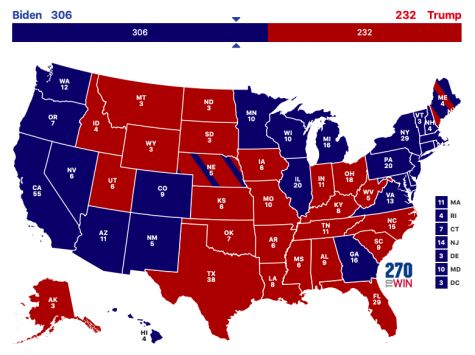The Electoral College: Admissible after All?

If there is one thing about American government that, to this day, is still unclear and divides the U.S. heavily, it would be the system that selects the president every four years: the Electoral College. The recent presidential election this November has caused discourse on the necessity of the Electoral College to rise again. Despite all the backlash that it has garnered, however, the Electoral College should continue to help choose future leaders of America.
The Electoral College is a system wherein citizens vote and the candidate who gets the majority of the states’ votes earns all the votes from the representatives for that state (with the exceptions being Maine and Nebraska, which split their electoral votes proportional to their popular vote). For example, if most voters in Massachusetts vote for a certain presidential candidate, even if that candidate only gets 51 percent of the vote, that candidate will receive all 11 electoral votes from Massachusetts. This system, however, gives more power to smaller rural states and takes power away from larger urban states.
Although many argue that this process of election is undemocratic because electoral votes do not reflect the votes of individual people, it may just be confusion over the U.S. government system. Mr. Andy Zou, an AP U.S. History teacher, explains that, “In America, we do have elements of a democracy. We really aren’t a democracy, but we are a representative republic, so we elect people to represent us.”
In addition, Emma Shay-Tannas (IV) mentions that, “The Electoral College […] puts a limit on how much influence a state can have over the country. America is a representative republic that keeps each state relevant.”
Smaller states would have little to no influence on elections without this system. The Electoral College makes sure that campaigns will encompass both urban and rural areas without one area dominating over another area; it prevents cities from over-influencing all the decisions made by the government.
With each elector from the rural states representing a smaller portion of people compared to urban states, smaller states have more power over the larger states, but for a good reason. Rural states produce the resources that urban cities take for granted, and if the Electoral College system was abolished, they would have a much smaller voice in deciding fundamental laws that would protect themselves and in providing for the rest of the country.
According to USA Today, “Rural America produces almost all our country’s food, as well as raw materials like metals, cotton and timber. Energy, fossil fuels but also alternatives like wind and solar come mostly from rural areas.”
Furthermore, the Electoral College was initially established to filter out the voices of misinformed citizens. “The Founding Fathers thought implementing the Electoral College as a system [was going to be] a good idea because at that time, and I think it still persists, the entire public is mainly uneducated and uninformed about politics and government,” says Isabella Tran (‘20).
Adding on, Mr. Zou observes, “I think there is a portion of this country that doesn’t really understand even the basics of U.S. government and politics, and yet they have a say. […] I want them to have a say, I just want them to have a more informed opinion.” It is clear that education in our country surrounding civics and government still needs a lot of improvement — until that happens, however, the Electoral College helps to mitigate any misconceptions.
Understanding the opinions and needs of surrounding communities and how that can have an influence on citizens is important for understanding the controversial aspects of the Electoral College.
“Those who are generally for the popular vote and against the Electoral College tend to be more liberal, more progressive and more Democratic, and live in a city,” Mr. Zou emphasizes.
Massachusetts, and Boston specifically, are areas that generally lean more liberal and therefore, more toward abolishing the Electoral College, but it is important to keep an open mind and see things from other perspectives, including how a country without the system would benefit cities like Boston, but would, in turn, neglect towns in rural America.






